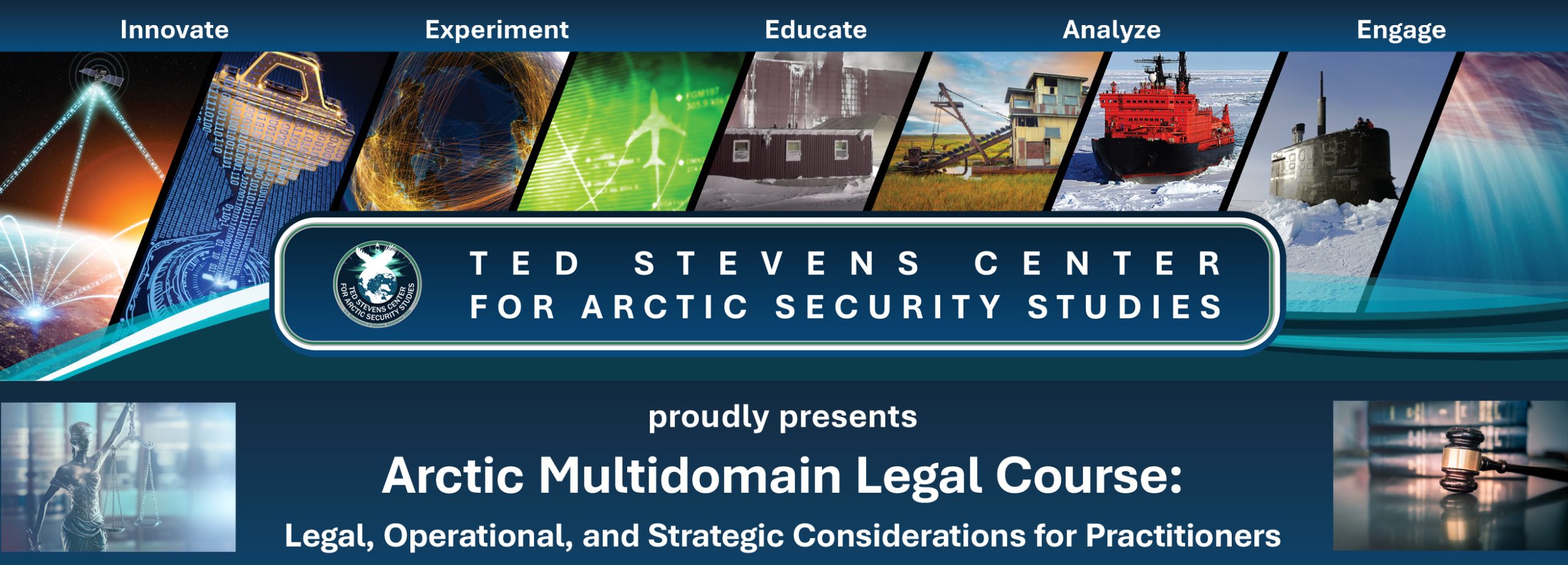
Editor’s note: This is part 3 of a 4-part series about Ted Stevens Center’s School for Arctic and Climate Security Studies courses.
In the ever-changing landscape of the Arctic, where environmental, economic, and geopolitical factors converge, understanding the legal complexities governing this region is paramount. The School for Arctic and Climate Security Studies recently concluded its 2023 Arctic Multidomain Legal Course (AMLC), a three-day virtual immersion into the legal, operational, and strategic considerations crucial for Arctic practitioners and security professionals.
Marking the final educational endeavor of the year, the AMLC brought together a diverse cohort of 105 participants from five different countries. This virtual congregation of minds aimed to equip attendees with the knowledge necessary to navigate the intricate legal frameworks shaping the Arctic’s future and reinforce the rules-based order that governs the region.
Matthew Bell, Dean of the School for Arctic and Climate Security Studies, highlighted the significance of the course. “The Arctic is undergoing tremendous transformation. Whether driven by climate change, global economic competition, or geopolitics, Arctic practitioners and security professionals must understand the legal mechanisms governing this region to adequately prepare for and meet current and emerging challenges and opportunities.”
ALMC focuses on three key learning objectives:
• Develop a basic understanding of the legal frameworks, instruments, and concepts related to the Arctic in relevant domains.
• Equip participants with analytical tools to identify, assess, and understand Arctic legal issues related to current challenges.
• Identify emerging legal issues for further inquiry and analysis.
As part of the broader mission of the Ted Stevens Center for Arctic Security Studies to foster regional collaboration for a peaceful, stable, prosperous, and cooperative Arctic, this course is intended for Arctic practitioners and security professionals (civilians, attorneys, or military leadership) in the United States and Allied countries whose positions require them to have a robust legal understanding of the Arctic.
Bell emphasized, “Since the course’s establishment in 2022, last week’s graduates are now part of a global Arctic security network with more than 1500 alumni to date. The School for Arctic and Climate Security Studies continues to refine the AMLC, with plans for hybrid and in-person courses at the Ted Stevens Center on Joint Base Elmendorf-Richardson in 2024, supporting the center’s goal of reaching full operational capacity.”
The Ted Stevens Center’s commitment to education to build a network of security-focused professionals is evident. The AMLC plays a crucial role in this endeavor, creating a pool of individuals capable of tackling the unique challenges of the Arctic.
As the center looks ahead to 2024, prospective participants are invited to join the following sessions of the AMLC scheduled for Jan. 30-Feb. 1, May 7-9, and Aug. 13-15.
To learn more about AMLC or to sign up for the course, visit: https://forms.office.com/g/H0Mw5C4t7H
Courtesy Graphic| The Arctic is undergoing tremendous transformation. Whether driven by climate change, global economic competition, or geopolitics, current and emerging challenges require Arctic practitioners and security professionals to have an understanding of the legal mechanisms governing this region in order to adequately prepare for and meet these challenges. This course examines the most relevant Arctic legal frameworks, instruments, and concepts across multiple domains. (Courtesy Graphic) View Image Page
